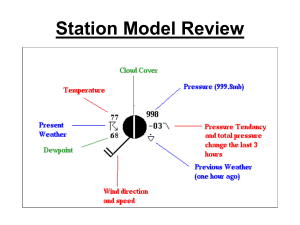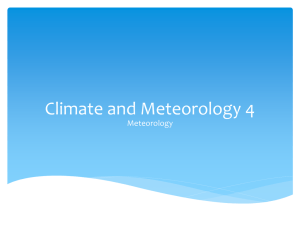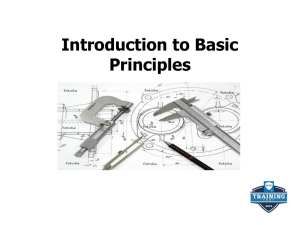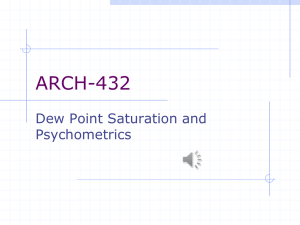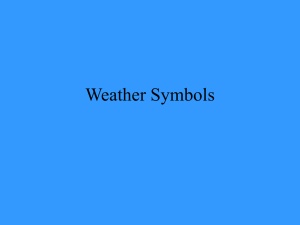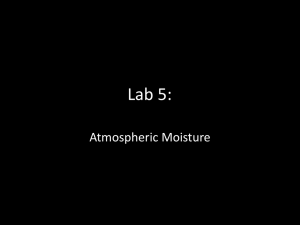Document
advertisement
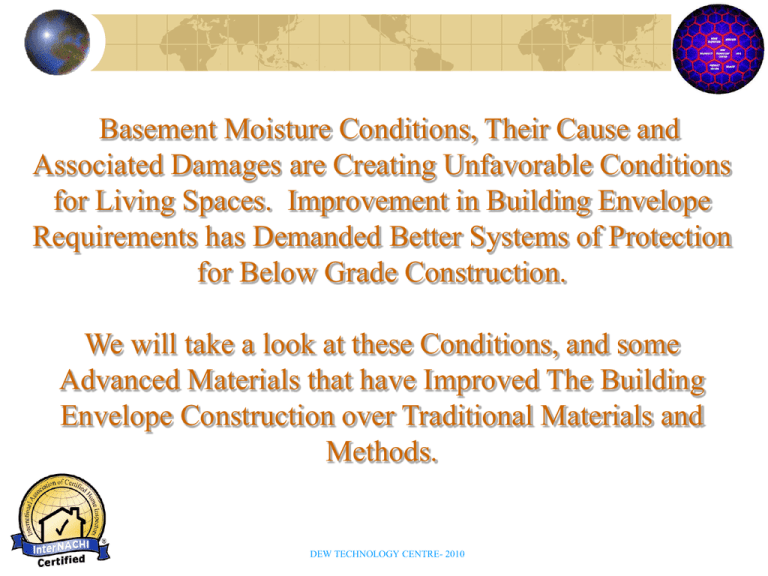
Basement Moisture Conditions, Their Cause and Associated Damages are Creating Unfavorable Conditions for Living Spaces. Improvement in Building Envelope Requirements has Demanded Better Systems of Protection for Below Grade Construction. We will take a look at these Conditions, and some Advanced Materials that have Improved The Building Envelope Construction over Traditional Materials and Methods. DEW TECHNOLOGY CENTRE- 2010 Moisture Problems – Major Causes of Below Grade Moisture Entry Concrete cracks - Cracks in a foundation walls of concrete or masonry compromises the structures ability to provide a barrier to water/moisture entry. Causes of cracks are settlement, expansive soils, frost, shrinkage due to natural process of concrete curing. Hydrostatic Pressure – Ground water pressure build up that exerts lateral and vertical pressures on the foundation structure Capillary Action – The movement of liquid moisture through a structure or substrate (concrete) using voids and fissures in the material acting as a path for water travel Vapor Transmission – The movement of air borne moisture through a structure or substrate due to vapor pressure equalization (high concentration to low concentration) Condensation – The formation of liquid moisture on or within a structure or substrate due to the airborne moisture concentration and temperature conditions being ideal for water to form DEW TECHNOLOGY CENTRE- 2010 Let’s take a look at these Five Major Causes of Moisture Entry into Basements Capillary Action Concrete Capillaries Capillary Development Minimal Wall Protection Water Pocket Water Intrusion Capillaries Foundation Wall DEW TECHNOLOGY CENTRE- 2010 Let’s take a look at how these Five Major Causes Affect Your Basements Capillary Action Insulation/Vapor Barrier Minimal Wall Protection Saturated Wall Assembly Water Pocket Mold & Mildew Dampness on Floor Moisture infiltration results in – Unhealthy Air + Dampness + Wall Assembly Damage DEW TECHNOLOGY CENTRE- 2010 Let’s take a look at these Five Major Causes of Moisture Entry into Basements Vapor Transmission Minimal Wall Protection 45% RH Water 65% RH Vapor RH = Relative Humidity 55% RH Water Vapor DEW TECHNOLOGY CENTRE- 2010 Let’s Review some Major Reasons for Defects in Foundation Walls Foundation/Soil Settlement Concrete Shrinkage Improper Grading Construction Joints Below Grade Services DEW TECHNOLOGY CENTRE- 2010 Traditional Materials and Application Methods to Waterproof Foundations as a Stand Alone Protection System are being Replaced or Complemented by Newer more Reliable Materials and Systems. Building Codes are taking notice of their Success and Endorses Their Use with Recognition of Third Party Product Testing, Assessments and Approvals. This Presentation will look at Two of the More Popular Systems being used in Construction Today. DEW TECHNOLOGY CENTRE- 2010 Advantages of Using Plastic Dimple Sheet & Geocomposite Drainage Products to Control Ground Moisture Migration, and Water Damage with the Potential to Reduce or Eliminate the formation of Mould and Mildew in Basements. DEW TECHNOLOGY CENTRE- 2010 How can Dimple Sheet Waterproofing Protect you from Water Damage Dimple Sheet Concrete Foundation Wall Cracks Structural Crack Water Basement Pocket Interior Water Pocket Crack Dimple Sheet bridges cracks in foundation walls to continue protecting your home and family even after a crack develops. DEW TECHNOLOGY CENTRE- 2010 How can Dimple Sheet Waterproofing Protect you from Water Damage Capillary Break (Stop) Dimple Sheet Dimple Sheet Capillary Break Water Pocket Basement Water Interior Pocket Foundation DEW TECHNOLOGY CENTRE- 2010 How can Dimple Sheet Waterproofing Protect you from Water Damage Vapor Transmission RH = Relative Humidity Dimple Sheet Dimple Sheet Vapor Retarder Interior 45% RH Water Dimple Sheet for 65% RH Under Slab Vapor Water Vapor Water Vapor Foundation DEW TECHNOLOGY CENTRE- 2010 How can Dimple Sheet Waterproofing Protect you from Water Damage Condensation DEW Point DEW Point Dimple Sheet Air Gap Dimple Sheet Interior Temperature 68° F Soil Temperature 37° F Soil Temp. 37° F Air Gap assists to reduce interior condensation on foundation walls by creating moderated air flow between Dimple Sheet and foundation wall Foundation Moderated Air Technologically Advanced Drainage Solutions over Traditional Drainage Systems Don’t Let Ground Water and Hydrostatic Pressure Stop You From Enjoying Your Home DEW TECHNOLOGY CENTRE- 2010 Conditions When You Should Consider Using Composite Drains Hill Side Construction High Ground Water Table (with mechanical pumping system) Perched Water Table Poor Draining Soils (Clay & Silt) Building in Flood Plain areas (with mechanical pumping system) Building near steep up sloped lands DEW TECHNOLOGY CENTRE- 2010 Hydrostatic Pressure – What Affects it has on Your Foundation Foundation Wall Hydrostatic Hydrostatic Wall Pressure Foundation Pressure Crack Wall Basement Floor Hydrostatic Wall Deflection Pressure Lateral Stresses Stress Cracks and Floor Slab Uplift DEW TECHNOLOGY CENTRE- 2010 Let’s see why Hydrostatic Pressure is a Cause of Moisture Entry into Basements Hydrostatic Pressure – Ground Water Minimal Wall Protection Interior Pressure Water Pocket Hydrostatic Pressure Basement Foundation Wall Concrete Capillaries DEW TECHNOLOGY CENTRE- 2010 The best way to deal with Hydrostatic Pressure is to “Redirect the Ground Water” to an outlet Let’s take a look at how Hydrostatic Pressure Affects Your Basement Hydrostatic Pressure – Ground Water Insulation/Vapor Barrier Minimal Wall Protection Saturated Wall Assembly Surface Finish Damaged Water Pressure Pocket Basement Flood Hydrostatic Pressure can cause – Basement Flooding + Structural Damage + Property Damage DEW TECHNOLOGY CENTRE- 2010 How can Technologically Advanced Drain Products Protect your foundation from Water Damage Hydrostatic Pressure – Ground Water Geocomposite Drain Board Basement Water Interior Pocket Waterproofing Drainage Core Fabric Water Pocket Foundation DEW TECHNOLOGY CENTRE- 2010 Additional Uses for Geocomposite Drainage Products DEW TECHNOLOGY CENTRE- 2010
